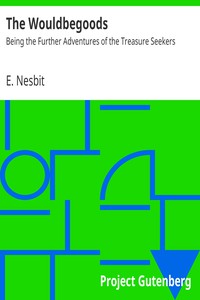The Wouldbegoods: Being the Further Adventures of the Treasure Seekers, E. Nesbit [red novels .TXT] 📗

- Author: E. Nesbit
Book online «The Wouldbegoods: Being the Further Adventures of the Treasure Seekers, E. Nesbit [red novels .TXT] 📗». Author E. Nesbit
N is for Noel, that makes the rhyme and the sense both right. O, W, N, own; do you see?’
We saw it, and said so, and the gentle poet was satisfied. And the council broke up. Oswald felt that a weight had been lifted from his expanding chest, and it is curious that he never felt so inclined to be good and a model youth as he did then. As he went down the ladder out of the loft he said—
‘There’s one thing we ought to do, though, before we go home. We ought to find Albert’s uncle’s long-lost grandmother for him.’
Alice’s heart beat true and steadfast. She said, ‘That’s just exactly what Noel and I were saying this morning. Look out, Oswald, you wretch, you’re kicking chaff into my eyes.’ She was going down the ladder just under me.
Oswald’s younger sister’s thoughtful remark ended in another council. But not in the straw loft. We decided to have a quite new place, and disregarded H. O.‘s idea of the dairy and Noel’s of the cellars. We had the new council on the secret staircase, and there we settled exactly what we ought to do. This is the same thing, if you really wish to be good, as what you are going to do. It was a very interesting council, and when it was over Oswald was so pleased to think that the Wouldbegoods was unrecoverishly dead that he gave Denny and Noel, who were sitting on the step below him, a good-humoured, playful, gentle, loving, brotherly shove, and said, ‘Get along down, it’s tea-time!’
No reader who understands justice and the real rightness of things, and who is to blame for what, will ever think it could have been Oswald’s fault that the two other boys got along down by rolling over and over each other, and bursting the door at the bottom of the stairs open by their revolving bodies. And I should like to know whose fault it was that Mrs Pettigrew was just on the other side of that door at that very minute? The door burst open, and the impetuous bodies of Noel and Denny rolled out of it into Mrs Pettigrew, and upset her and the tea-tray. Both revolving boys were soaked with tea and milk, and there were one or two cups and things smashed. Mrs Pettigrew was knocked over, but none of her bones were broken. Noel and Denny were going to be sent to bed, but Oswald said it was all his fault. He really did this to give the others a chance of doing a refined golden deed by speaking the truth and saying it was not his fault. But you cannot really count on anyone. They did not say anything, but only rubbed the lumps on their late-revolving heads. So it was bed for Oswald, and he felt the injustice hard.
But he sat up in bed and read The Last of the Mohicans, and then he began to think. When Oswald really thinks he almost always thinks of something. He thought of something now, and it was miles better than the idea we had decided on in the secret staircase, of advertising in the Kentish Mercury and saying if Albert’s uncle’s long-lost grandmother would call at the Moat House she might hear of something much to her advantage.
What Oswald thought of was that if we went to Hazelbridge and asked Mr B. Munn, Grocer, that drove us home in the cart with the horse that liked the wrong end of the whip best, he would know who the lady was in the red hat and red wheels that paid him to drive us home that Canterbury night. He must have been paid, of course, for even grocers are not generous enough to drive perfect strangers, and five of them too, about the country for nothing. Thus we may learn that even unjustness and sending the wrong people to bed may bear useful fruit, which ought to be a great comfort to everyone when they are unfairly treated. Only it most likely won’t be. For if Oswald’s brothers and sisters had nobly stood by him as he expected, he would not have had the solitary reflections that led to the great scheme for finding the grandmother.
Of course when the others came up to roost they all came and squatted on Oswald’s bed and said how sorry they were. He waived their apologies with noble dignity, because there wasn’t much time, and said he had an idea that would knock the council’s plan into a cocked hat. But he would not tell them what it was. He made them wait till next morning. This was not sulks, but kind feeling. He wanted them to have something else to think of besides the way they hadn’t stood by him in the bursting of the secret staircase door and the tea-tray and the milk.
Next morning Oswald kindly explained, and asked who would volunteer for a forced march to Hazelbridge. The word volunteer cost the young Oswald a pang as soon as he had said it, but I hope he can bear pangs with any man living. ‘And mind,’ he added, hiding the pang under a general-like severeness, ‘I won’t have anyone in the expedition who has anything in his shoes except his feet.’
This could not have been put more delicately and decently. But Oswald is often misunderstood. Even Alice said it was unkind to throw the peas up at Denny. When this little unpleasantness had passed away (it took some time because Daisy cried, and Dora said, ‘There now, Oswald!’) there were seven volunteers, which, with Oswald, made eight, and was, indeed, all of us. There were no cockle-shells, or tape-sandals, or staves, or scrips, or anything romantic and pious about the eight persons who set out for Hazelbridge that morning, more earnestly wishful to be good and deedful—at least Oswald, I know, was—than ever they had been in the days of the beastly Wouldbegood Society. It was a fine day. Either it was fine nearly all last summer, which is how Oswald remembers it, or else nearly all the interesting things we did came on fine days.
With hearts light and gay, and no peas in anyone’s shoes, the walk to Hazelbridge was perseveringly conducted. We took our lunch with us, and the dear dogs. Afterwards we wished for a time that we had left one of them at home. But they did so want to come, all of them, and Hazelbridge is not nearly as far as Canterbury, really, so even Martha was allowed to put on her things—I mean her collar—and come with us. She walks slowly, but we had the day before us so there was no extra hurry.
At Hazelbridge we went into B. Munn’s grocer’s shop and asked for ginger-beer to drink. They gave it us, but they seemed surprised at us wanting to drink it there, and the glass was warm—it had just been washed. We only did it, really, so as to get into conversation with B. Munn, grocer, and extract information without rousing suspicion. You cannot be too careful. However, when we had said it was first-class ginger-beer, and paid for it, we found it not so easy to extract anything more from B. Munn, grocer; and there was an anxious silence while he fiddled about behind the counter among the tinned meats and sauce bottles, with a fringe of hobnailed boots hanging over his head.
H. O. spoke suddenly. He is like the sort of person who rushes in where angels fear to tread, as Denny says (say what sort of person that is). He said—
‘I say, you remember driving us home that day. Who paid for the cart?’





Comments (0)